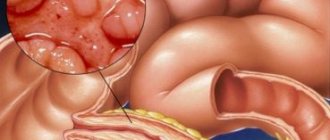Pepsin enzyme
The enzyme became famous thanks to the well-known “Pepsi Cola”, which Caleb Bradham produced from pepsin and kola nuts. Pepsin is a protein-digesting enzyme found in the stomachs of vertebrates. Since it works most effectively in a very acidic environment, more precisely at a pH value of 1-4, it fits perfectly into the human stomach. The breakdown of proteins from food is of great importance for digestion.
The enzyme breaks down proteins into short-chain amino acids so the metabolism can better use them. On the one hand, it serves for general energy production and maintenance of important organ functions; on the other hand, the broken down proteins help build muscle. Therefore, pepsin is a popular additive in nutritional supplements for athletes. In addition, it serves as an additional drug to improve digestion and relieve stomach problems. For dietary supplement production or industrial use, pepsin is obtained from animal sources, such as pig stomachs.
The enzyme became famous thanks to the well-known Pepsi Cola, which Caleb Bradham produced from pepsin and kola nuts
Cheese making
Pepsin acid has been successfully used in cheese due to its ability to curdle milk. According to the rules, rennet is used in cheese making, but it is not always available. This is where the advantages of Acidin tablets manifest themselves - availability in any pharmacy, low cost, good quality of the prepared product. The pharmaceutical preparation is successfully used for the production of Adyghe cheese, feta cheese, cheeses such as Suluguni and mozzarella.
Sequence of making homemade cheese:
- Eight tablets are ground in a mortar to a fine powder, pour 100 ml of boiled water at room temperature.
- The dissolved tablets are added to 4 liters of warm milk (temperature no more than 32° C) and mixed well. The fat content of milk should be at least 3%.
- After 10-15 minutes, place the pan with milk on low heat; if the dishes are thin-walled, use a divider. The mixture is heated while stirring slowly using a wooden spatula (movements should be directed in one direction).
- When the milk temperature reaches 80−90° C, the whey will begin to separate and a cheese ball will form.
- After the milk is completely separated into whey and cheese mass, the pan is removed from the heat.
- The contents of the pan are transferred to a colander to separate the cheese lump.
- The hot cheese is squeezed out, placed in a mold (bowl, saucepan), and pressed down on top with a weight.
- The whey released from the cheese is periodically drained.
- After two hours, the cheese is poured with brine made from salt and boiled water (it can be used hot or cold, there is no difference). The saline solution is prepared to taste.
Pepsin enzyme functions
Pepsin is an enzyme that breaks down proteins in the stomach in food. Thus, it plays an important role in digestion. Pepsin increases the availability of amino acids. This requires an acidic environment. Since the enzyme forms on its own, it is only required in cases of deficiency. However, due to its digestive properties, pepsin is often used in dietary supplements.
Pepsin is an important digestive enzyme. This allows the body to replace bacteria that may eventually develop into a tumor with new, healthy cell tissue. At the same time, pepsin promotes cell agglomeration and thus accelerates wound healing. Although it promotes blood flow, the enzyme reduces the risk of vascular deposits and inflammation.
Motor functions
The motor function of the stomach is considered more important from the point of view of influencing both the pathology and physiology of the digestive organs themselves.
In the process of implementing this function, the food that enters the stomach is ground, mixed, and further displaced into the duodenum. The function in question is carried out thanks to the coordinated work of a number of its elements and peristaltic contractions.
Peristalsis
– this is the most important component in motor activity. It begins within approximately 7 minutes, counting from the moment of food intake and is repeated in increments of 21 seconds.
Absorption functions do not work for the vast majority of products entering the stomach (if it is healthy). The following elements are slightly absorbed: bromine, water and several other elements.
Where is pepsin used?
| area of use | description |
| medicine | To improve digestion and combat stomach problems. Doctors mainly prescribe it to people who have lost their appetite or have had their stomach removed. |
| Food production | Especially in the production of cheese and other protein products. |
| Cosmetical tools | Use in face masks |
| Nutritional supplements | To increase protein availability and strengthen muscle mass. |
Precautionary measures
Side effects may occur when taking medications/supplements containing pepsin, which are usually rare but sometimes serious. Some of the side effects include abdominal pain, severe stomach upset, nausea, skin rash, and diarrhea (8). These adverse reactions are most likely if you take too much at once.
Always contact your doctor if you experience any effects from using these supplements, especially if you feel unwell. Also check with your doctor before taking any supplements if you take medications regularly; you have allergies or current illnesses that you are treating; or if you are pregnant, planning to become pregnant or breastfeeding.
Final Thoughts
- Pepsin is a digestive enzyme in the stomach. Pepsin functions to break down proteins into smaller units called polypeptides (or peptides or short). Which gland secretes pepsin? It is produced by cells in the stomach lining. This enzyme is formed when the inactive enzyme pepsinogen is mixed with hydrochloric acid (stomach acid/stomach juice) and converted into an active enzyme.
- What substance in the stomach helps pepsin work? It works at an acidic pH, ideally in an environment with a pH of 1.5–2. Gastric juices in the stomach, which are highly acidic, help this enzyme break down food properly. This is why low stomach acid can be problematic.
- Digestive enzymes, called proteolytic enzymes, are the type needed to digest protein. Betaine hydrochloride with pepsin is an example of a supplement that is taken over the counter. However, it may have side effects, so it is best to consult your doctor.
- People who may benefit from taking digestive enzyme supplements include those with low stomach acid, pancreatitis, IBS, enzyme deficiency, pancreatic insufficiency, vitamin B12 deficiency or iron deficiency, constipation, diarrhea, and bloating.
- Foods that can help provide you with natural digestive enzymes that support protein digestion include pineapple, papaya, kiwi, fermented milk, mango, miso, sauerkraut, kimchi, avocado, bee pollen, apple cider vinegar and raw honey.
Development and symptoms of pepsin deficiency
On the other hand, excess pepsin often causes heartburn.
With pepsin deficiency, the body lacks valuable nutrients due to the important digestion of proteins. Proteins from food pass through the digestive tract, but the body does not extract energy from them. This manifests itself in significant digestive problems. Pepsin deficiency is often caused by restricted gland activity. In addition, injuries from accidents or internal damage cause a lack of pepsin production. The following diseases are also considered risk factors:
- neurasthenia
- Diseases of the brain or spine
- Inflammation
- Prolonged fever
- diabetes
- Heart diseases
- Stomach ulcer
Interaction
Simultaneous use of enzyme preparations and acid-reacting agents,
The drug "Acidin pepsin" is a fairly effective and good remedy that contains digestive enzymes. At the same time, digestion in the stomach of those taking this medicine is significantly improved. The drug contains 2 active substances:
1. betaine. Thanks to this substance, it is formed in the stomach and takes an active part in the decomposition of delivered food. This is a kind of activator of many processes.
2. pepsin. Initially, such a substance is an inactive proenzyme (pepsinogen), which is contained in the mucous membrane lining the stomach. Only when food gets there does it turn into active pepsin. Together with betaine, this substance significantly increases not only the secretion of gastric juice, but also its acidity. Among other things, these 2 substances have useful proteolytic properties. All this contributes to good digestion.
Indications for use of "Acidin pepsin"
gastritis of hypocidal and anacid types. The second option is a chronic disease in which acidity is greatly reduced. The thing is that the secretion of hydrochloric acid is practically not released. In hypocidal gastritis, it does not secrete enough. This is a rather complex and serious problem of the human body. After all, normal acidity provides a good bactericidal effect. And with such diseases, infection with microbes is possible, and therefore the manifestation of all kinds of inflammation of the stomach. Hence the development of a variety of pathologies. Among other things, low acidity promotes the accumulation of products that are obtained after the breakdown of proteins. This even leads to the occurrence of terrible cancer diseases. When treating such diseases, it is imperative to use drugs that have the ability to replace hydrochloric acid. Acidin pepsin is such a medicine.
The drug is also prescribed for inflammatory processes in the stomach.
Ahalia is also a disease in which there is a complete absence of secretion and no enzymes at all.
The indication for use of the medicine is indigestion of any level
"Acidine pepsin." Dosage instructions
The drug is produced in the form of tablets, which are taken orally, first dissolving in water. They can be consumed before or after meals. They are prescribed to both children and adults. However, of course, the dosage is different.
Adults are supposed to take 2 dissolved tablets about 4 times a day. For children, a quarter of the tablet dissolves. However, the amount taken is exactly the same. The course of treatment largely depends on the effectiveness of recovery and the severity of the disease.
Side effects and contraindications
Very rarely, the drug can cause nausea, allergies, constipation or heartburn. In this case, it is recommended to reconsider the medication and prescribe a milder analogue. "Acidin pepsin" is sometimes replaced with "Pepsamin", "Betacid" or "Acipepsol".
These tablets should never be used if the patient is hypersensitive to one of the ingredients of the medication. It is not recommended to use the medicine if the gastric juice has such a property as hyperacidity. It manifests itself in peptic ulcers.
There is no data on the effect of the drug on pregnant and lactating women.
Therefore, in this case, it should be used with caution and under the strict and special supervision of a doctor.
Digestive problems are quite common in modern medical practice. The drug "Acidin-pepsin" is considered one of the few drugs that can quickly cope with such disorders. And today many people are interested in information about the composition and properties of this medicine.
Treatment and prevention of pepsin deficiency
To counteract pepsin deficiency, doctors prescribe the enzyme as a supplement in capsule or tablet form.
- Pepsin is available in powder form, which should be stored in closed jars, in a dark place, at a temperature from +2 to +15oC. The powder has a yellowish or white color, a sweet and sour taste, and is highly soluble in water and ethyl alcohol (20%). In the pharmacy, a solution of pepsin and hydrochloric acid in water is prepared from the powder.
- Pepsin K (chicken pepsin) – 0.1 g tablets; the tablet contains 0.04 g of pepsin; per package 25 or 50 tablets.
- Acidin-pepsin (a combined drug consisting of 1 part pepsin and 4 parts betaine hydrochloride) is available in the form of tablets of 0.25 or 0.5 g, 50 pieces per package.
- Ointment with pepsin is not produced by pharmaceutical factories, but is prepared in pharmacies according to a prescription (5-10% ointment: pepsin with hydrochloric acid on a vaseline or lanolin basis).
Indications and contraindications
The drug is prescribed for gastritis with low acidity and anacid gastritis, that is, in the absence of hydrochloric acid production. These diseases are accompanied by pain in the epigastric region, flatulence, and diarrhea due to the inability of the stomach to digest food. Pepsin eliminates the listed symptoms, patients return to a normal diet.
The dosage regimen for adults is 2 tablets during or immediately after meals. Before taking the medicine, dissolve it in 50-100 ml of water. To increase the effectiveness of the drug and improve food digestion, enzyme preparations that contain pancreatin are prescribed in parallel: Creon, Festal, Mezim. The duration of treatment is determined individually for each patient.
Contraindications to taking the drug are gastritis with high acidity, peptic ulcer, erosive gastroduodenitis. Due to the insufficient number of clinical studies, the drug is not used to treat children; its effect on the body of pregnant and lactating women has not been studied.
In case of an overdose of the enzyme preparation, gastrointestinal disorders such as nausea, heartburn, and loose stools are possible. It is not recommended to take Acidin with antacids at the same time, as these drugs reduce its activity.
During treatment, it is forbidden to drink alcohol, since under its influence pepsin is completely destroyed.
Latest Research and Conclusions
Pepsins can also be reactivated in a neutral environment.
For a long time it was believed that pepsin acted only in the stomach. However, researchers have now discovered that the enzyme is still 10% active even at a pH of 6. Accordingly, pepsins may be found in other parts of the body. Although they temporarily cease to function in an alkaline environment, reintroduction of acid may restore their effectiveness. This can lead to complaints such as silent reflux.
Biological role and structure of proteins.
Proteins are high-molecular nitrogen-containing organic substances, the molecules of which are built from amino acid residues.
All natural proteins consist of a small number of relatively simple structural blocks, represented by monomeric molecules - amino acids, linked to each other in polypeptide chains.
Functions of proteins: 1) Structural:
- in connective tissue – collagen, elastin, keratin
- construction of membranes and formation of the cytoskeleton (integral, semi-integral and surface proteins) – spectrin (surface, the main protein of the cytoskeleton of erythrocytes), glycophorin (integral, fixes spectrin on the surface)
- construction of organelles - ribosomes
2) Enzymatic:
All enzymes are proteins
3) Hormonal:
Regulation and coordination of metabolism in different cells of the body - many hormones, for example, insulin and glucagon.
4) Receptor:
Selective binding of hormones, biologically active substances and mediators on the surface of membranes or inside cells.
5) Transport:
Transfer of substances in the blood - lipoproteins (fat transport), hemoglobin (oxygen transport), transferrin (iron transport) or across membranes - Na+,K+-ATPase (opposite transmembrane transport of sodium and potassium ions), Ca2+-ATPase (pumping calcium ions from cells).
6) Reserve: production and accumulation of ovalbumin in the egg.
7) Nutritional: breast milk proteins, muscle and liver proteins during fasting.
Protective: the presence of immunoglobulins and blood clotting proteins in the blood.










